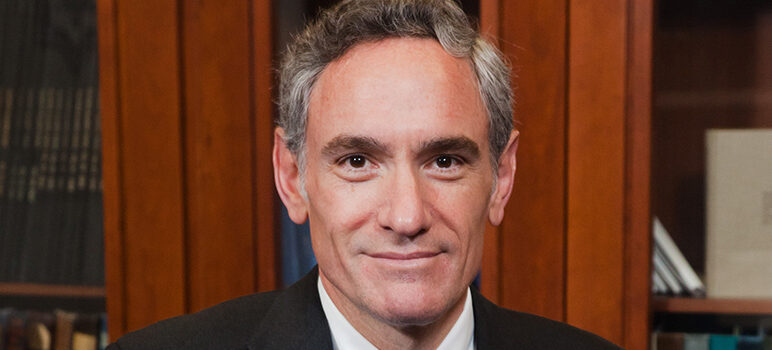Scott Atlas, the Stanford University fellow who became President Donald Trump’s handpicked pandemic advisor, has stepped down from the White House.
“I always relied on the latest science and evidence, without any political consideration or influence,” Atlas wrote in a resignation letter posted to Twitter Monday.
Honored to have served @realDonaldTrump and the American people during these difficult times. pic.twitter.com/xT1hRoYBMh
— Scott W. Atlas (@ScottWAtlas) December 1, 2020
Atlas, a radiologist with no infections disease expertise, joined the White House a few months ago after multiple Fox News appearances in which he downplayed the threat of Covid-19. But the Stanford radiologist butt heads with the administration’s public health experts by assiduously promoting a more optimistic outlook for the pandemic.
Beyond the White House, medical experts slammed Atlas—a fellow at Stanford’s conservative Hoover Institution—for promoting the controversial concept of herd immunity—the idea that the nation could achieve widespread resistance to the novel coronavirus by allowing it to spread unchecked throughout the population.
Atlas joined the administration for a 130-day detail, which was set to sunset this week.


> for promoting the controversial concept of herd immunity—the idea that the nation could achieve widespread resistance to the novel coronavirus by allowing it to spread unchecked throughout the population.
What’s controversial about herd immunity?
Viruses spread. It’s what viruses do.
Viruses spread until there’s no more hosts to infect.
Masks and social distancing just slow things down — maybe — until the herd is immune.
Like the corona virus, shoddy science is both contagious and lethal. A case in point is Dr. Atlas’ rise to national prominence after touting the negligence approach to “herd immunity.” Hard right libertarians, like Atlas (https://www.npr.org/sections/coronavirus-live-updates/2020/11/17/935797949/stanford-university-appears-to-distance-itself-from-scott-atlas-after-rise-up-tw), are more interested in preventing interruptions in the business as usual that enables the wealth accumulation of their enablers than in sound science.
The herd immunity for which Atlas argues is one in which a new, highly contagious and deadly virus, is allowed to work its way through a susceptible population unhindered until it peters out on its own. Of the more than 13.6 million known COVID-19 cases in the U.S. thus far, nearly 270,000 people have died yielding a death rate of about 2 percent of detected infection cases (https://covid.cdc.gov/covid-data-tracker/#cases_casesper100klast7days).
If Atlas had his way and the entire U.S. population were to be infected, we could expect some 6.5 million deaths, in addition to about 16.5 million hospitalizations (about 5% of the infected population according to https://www.cdc.gov/coronavirus/2019-ncov/covid-data/covidview/index.html), keeping in mind that at the beginning of the COVID-19 crisis there were fewer than 1 million staffed hospital beds in the U.S. (https://www.aha.org/statistics/fast-facts-us-hospitals).
If some type of herd immunity is achieved with only a 70% infection rate of the total population, as scientists suggest might be the case, total expected deaths would decline to about 5.8 million, with about 11.5 million hospitalizations (https://www.nature.com/articles/d41586-020-02948-4). Either way, there would be millions dying unnecessarily and even more millions requiring hospitalization way beyond the capacities of U.S. medical facilities.
Based on what is presently known about COVID-19, immunity responses from infection, assuming the patient survives, last perhaps as long as 5-7 months and researchers conjecture that such immunity may last longer–perhaps a year or so–based on evidence from other SARS-CoV viruses (https://www.healthline.com/health-news/how-long-does-immunity-last-after-covid-19-what-we-know#What-we-currently-know-about-COVID-19-immunity). Beyond this, there are a number of cases of reinfection from around the world: people infected with, and who recovered from, COVID-19 were subsequently re-infected within months of their first infection (https://www.thelancet.com/journals/laninf/article/PIIS1473-3099(20)30764-7/fulltext). So there is a possibility that any herd immunity would be short-term or temporary in nature and potentially could be defeated by re-infections.
Rather than develop herd immunity the way it has always been done–on the basis of developing and using vaccines to immunize larger and larger segments of the population over time (think polio) (https://www.nature.com/articles/d41586-020-02948-4)–Atlas and his ilk would choose to needlessly and recklessly endanger the lives of millions. They, of course, are taking their cues from–and following the lead of–the pestilence disguised as national political leadership (https://khn.org/morning-breakout/study-trump-rallies-spreading-coronavirus-and-death/).
Let’s keep our wits about us, avoid the “herd mentality” fostered by Atlas and San Jose Inside troll commentators and follow the prudent guidance of public health officials based on the experience and evidence from the past 9 months. This is the only prudent way to protect and enhance the lives of our loved ones and our communities.
> Let’s keep our wits about us, avoid the “herd mentality” fostered by Atlas and San Jose Inside troll commentators and follow the prudent guidance of public health officials based on the experience and evidence from the past 9 months.
1.) “herd immunity” is GOING to be achieved at some point.
Viruses spread as long as there is a sufficient number of hosts to infect. When there are no longer enough hosts the virus stops spreading.
It’s science.
2.) The “prudent guidance of public health officials” as changed numerous times.
It’s almost as if they don’t know what they’re doing.
It’s politics.